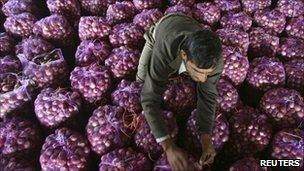World food prices at fresh high, says FAO
- Published

World food prices rose to a record high in January, according to the UN's Food and Agricultural Organization (FAO).
The FAO Food Price Index, which measures the wholesale price of basic foods within a basket, averaged 231 points last month - its highest level since records began in 1990.
It was up 3.4% from December, the seventh monthly rise for the index.
"These high prices are likely to persist in the months to come," FAO economist Abdolreza Abbassian said.
The index is now higher than it was in June 2008 when the cost of food sparked violent protests in countries including Cameroon, Haiti and Egypt.
The individual group components of the index, apart from meat, all registered rises in January.
The Cereal Price Index averaged 245 points in January reflecting rises in the price of wheat and grain. This was driven higher by flooding in Australia, which is a major wheat exporter.
Rice prices fell slightly as the data coincided with harvests in many countries.
Contamination fear
Rises were particularly high for dairy products, up 6.2% from December. Prices were driven higher by a combination of lower supply and increasing demand in emerging economies such as China and India.
The Meat Price Index held steady at 166 points despite falling prices in Europe where a large amount of animal feed was found to have been contaminated with dioxin.
This was offset by a small increase in meat prices in Brazil and the United States.
Sugar prices also remained high due to tight supplies.
Political unrest
The high price of food is thought to have been a factor in recent political unrest in both Algeria and Tunisia in the form of anti-government demonstrations, protests which have spread to neighbouring Egypt and Jordan.
Recently, white sugar futures hit a record high because of concerns about the damage Cyclone Yasi could cause to the Australian cane crop.
World Bank President Robert Zoellick has asked global leaders to "put food first" and tackle the problem of price volatility.
"We are going to be facing a broader trend of increasing commodity prices, including food commodity prices," he said.
Commodities prices have been on the rise generally with copper hitting a record high of $10,000 a tonne.
Oil was also up on Thursday with Brent crude rising to $103.37 a barrel.
- Published31 May 2011